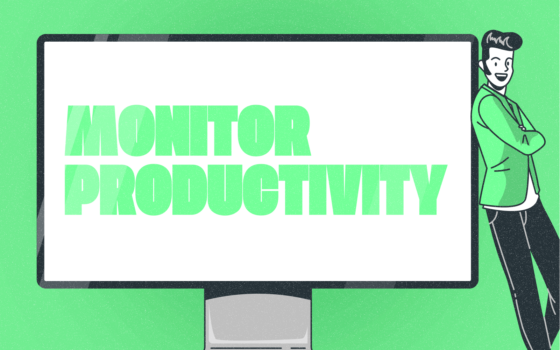How to be an Effective Remote Manager: Best Practices for Managing Remote Teams

With so many people working remotely these days, the remote manager has become a critical role in companies of all sizes. Remote managers are responsible for ensuring that their team members have the resources and support they need to be productive, while also maintaining communication and collaboration. Sounds exhausting, eh?
Yet, not impossible! If you are responsible for overseeing a remote team, it is important to create and implement an effective remote management plan. In this blog post, we are helping you to set the best plan to have the best outcomes! Keep reading for you to become an effective remote manager.

Lately, it seems we can’t stop talking about remote work or remote employees, and while it may sound redundant, the job market states otherwise as even Upwork, one of the largest freelancing platforms, affirms that by 2028, 73% of all departments will have remote workers.
Remote management is the present AND the future of work, so if you want to stay ahead of the curve, it’s important to understand how to manage a remote team effectively. In fact, if you still have your doubts, let’s review some numbers!
The growing popularity of remote desktop tools was demonstrated in April 2020 by the increase in IT spending. Web conferencing software and learning management systems (LMS) have also seen substantial increases. A survey of over 2,000 members of the TrustRadius community showed that more than 50% of businesses expected to increase their spending on remote desktop software.

Zoom, in particular, has seen a meteoric rise in popularity and usage since the pandemic began. The company’s stock price has more than quadrupled since March 2020. Basically, this app became the ipso-facto platform for video conferencing. Massive growth!

The Role of the Remote Manager
Whilst a lot has changed over the last two years, one thing that hasn’t is the importance of effective management. In any workplace – whether it’s remote or not – good management practices are key to maintaining employee productivity and engagement.
A remote manager is a type of manager who oversees the work of employees who are not physically present in the same location
This can include employees who work from home, as well as those who are based in different offices or countries. As a remote manager, you need to:
- Be proactive in your approach and take the time to get to know your team members, their strengths, and their weaknesses. This will allow you to give them the support they need to be successful in their roles.
- It is also important to build a solid foundation of trust with your team. Remote workers need to feel like they can rely on you to be there for them when they need you. Trust is essential for any relationship – especially when it comes to remote work.
- To build trust, you need to be transparent in your communication and allow employees to provide feedback – both positive and negative. Feedback should be given frequently, and employees should feel like their voices are being heard
- Last but not least, as a remote manager, you also need to make sure that your team has the resources they need to be successful. This includes access to the right tools and technologies, as well as training and development opportunities.
Creating a Remote Management Plan: Best Practices for Managing Remote Teams
A remote management plan is a comprehensive document that sets out the strategy and actions for managing a remote team. The plan should cover all aspects of team management, from recruitment and onboarding to performance reviews and offboarding.
It should also include contingency plans for dealing with unexpected absences or emergencies!
The first step in creating an effective remote management plan is to assess your team’s needs, as well as your own! What resources do they and you need to be successful? What challenges you all are facing as a team?
Once you have a good understanding of everyone’s needs, you can start putting together a plan that will help them meet their goals. Here are some overall key components of an effective remote management plan:
Sometimes, we can identify what others need to do, but what about you?
Decide Your Management Style
When you manage a remote team, the management style you use can have a big impact on your team’s performance. There are several different management styles, and each has its own strengths and weaknesses.
It’s important to consider the nature of your team and the work that you do before you decide on a management style
For example, if you have a very detail-oriented team member, you may need to provide more structure and clear expectations. On the other hand, if you have a more creative team members, you may need to give them more freedom to experiment and take risks.
You can explore the management styles here.

Define Roles and Responsibilities
- Roles refer to one’s position on a team.
- Responsibilities are the assigned tasks and duties of an employee that relate to their particular job role.
Defining roles and responsibilities is critical for any team, but it becomes even more important when managing a remote team. Without a clear understanding of who is responsible for what, team members can quickly become frustrated and bogged down in tasks that are outside of their scope.
When defining roles and responsibilities, it is important to be as specific as possible
Additionally, setting clear expectations can help to prevent misunderstandings and miscommunication. When defining roles and responsibilities for remote teams, managers should consider the individual strengths and weaknesses of each team member.

Consider Strengths and Weaknesses of each Team Member
When it comes to managing a remote team, it’s important to consider the individual strengths and weaknesses of each team member. By understanding the unique skills and abilities of each team member, you can better allocate tasks and ensure that everyone is working to their full potential.
Additionally, by taking into account each person’s strengths and weaknesses, you can more easily identify areas where team members may need additional support or assistance. Ultimately, by considering the individual strengths and weaknesses of each team member, you can create a more cohesive and effective remote team.
When hiring new staff or even during onboarding, consider the list below to get to know your team!

Set Your Communication Style
When you’re not in the same location as your team, communication becomes even more important. You need to be clear and concise in your communication, and make sure that everyone is on the same page.
You should also use a variety of different communication channels – from email to video conferencing – to stay connected with your team.

Here are a few tips to help you set your communication style for remote team management:
- Keep it simple: When you’re communicating with your team, avoid using jargon or technical terms. Instead, focus on using clear and concise language. This will help ensure that everyone on your team understands what you’re trying to say.
- Be direct: It’s important to be direct when communicating with your team. This means that you should avoid beating around the bush or hinting at what you want. Instead, simply state what you need or expect from your team. This will help prevent miscommunication and ensure that everyone is on the same page.
- Be available: When managing a remote team, it’s important to be available when your team needs you. This means being responsive to emails and phone calls, and making yourself available for video chats or in-person meetings when necessary. By being available, you’ll show your team that you’re committed to their success.
Build Trust Remotely
Trust is the glue that holds teams together. It’s what allows team members to rely on each other, feel safe to take risks and be vulnerable with each other. But what happens when team members are spread out across the globe? Is it still possible to build trust remotely?
The answer is yes! Building trust remotely is essential for effective remote team management. Here are a few tips for how to do it:
- Make sure everyone feels heard and respected: Active listening is key to building trust. Make sure everyone on your team feels like their opinions and ideas are valued. One way to do this is to create dedicated time and space for open dialogue, whether that’s through regular team meetings or an online forum.
- Be transparent and honest with each other: Remote teams need to be able to rely on each other, which means being honest and transparent with each other. When something goes wrong, don’t try to hide it – own up to it and work together to find a solution. Honesty builds trust.
- Keep your promises and follow through on your commitments: If you say you’re going to do something, make sure you do it. This sounds simple, but it’s important – if you can’t be relied on to follow through on your commitments, team members will quickly lose trust in you (and in the team as a whole).
Make sure everyone knows they can count on you – and vice versa!

Identify and Provide the Right Tools
Managing a remote team can be a challenge, but the right tools can make it easier. Identifying the needs of your team and providing the right tools can help you stay organized and keep communications flowing. Here are some essential tools for remote team management:
- A project management tool: This can help you stay on top of deadlines and keep track of progress.
- A messaging app: This will allow you to communicate with your team quickly and easily.
- A file sharing service: This will allow you to share documents and files with your team without having to email them back and forth.
- A task tracking tool: This can help you delegate tasks and keep track of who is responsible for what. Consider Monitask!
By identifying the needs of your team and providing the right tools, you can make remote team management much easier.
Don’t Forget About Social Interaction
Yes, it’s important to focus on the task at hand and make sure that everyone is meeting their deadlines. However, social interaction is still important for remote teams. It helps to build trust and rapport, and it can also be a great way to resolve conflicts.
There are a few simple ways to encourage social interaction among your team members.
- Make sure to schedule regular video calls, even if there isn’t necessarily anything to discuss. These calls help to create a sense of connection and community.
- You can also set up chat rooms for your team members to socialize in or create opportunities for them to work on projects together.
Best Practices to Manage a Remote Team: Summary
To help you remember the pathway to being a successful manager, we have compiled the key starting points:
- Set Roles and Responsibilities: Every member of your team should know what is expected of them. Roles and responsibilities should be clearly defined from the outset.
- Set objectives and KPIs: Objectives and KPIs should be aligned with the company’s overall goals. This will help ensure that everyone is working towards the same objectives.
- Create a communication plan: A good communication plan will help ensure that everyone is on the same page. It should include regular check-ins, as well as a process for handling questions and concerns.
- Put together a training and development plan: Remote workers need to have access to the resources they need to be successful. This includes training and development opportunities.
- Implement a performance management system: A performance management system will help you track progress and identify areas of improvement.
By following these best practices, you can be sure that your remote team will be well-managed and productive. Do you have other tips in mind? Make sure to apply them!
The Bottom Line
Effective remote management is essential to the success of any remote team. By taking the time to assess your team’s needs and put together a solid plan, you can set them up for success. Remote work is here to stay, so you must have the tools and resources you need to be successful.
Our team is dedicated to helping you to become the best manager or employee, don’t hesitate to read our others posts!
-The Monitask Team


